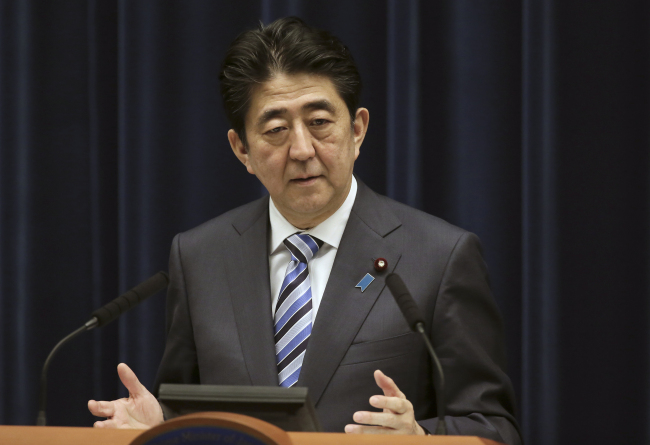- California Assembly OKs highest minimum wage in nation
- S. Korea unveils first graphic cigarette warnings
- US joins with South Korea, Japan in bid to deter North Korea
- LPGA golfer Chun In-gee finally back in action
- S. Korea won’t be top seed in final World Cup qualification round
- US men’s soccer misses 2nd straight Olympics
- US back on track in qualifying with 4-0 win over Guatemala
- High-intensity workout injuries spawn cottage industry
- CDC expands range of Zika mosquitoes into parts of Northeast
- Who knew? ‘The Walking Dead’ is helping families connect
Japan extends sanctions against N. Korea for 2 more years

Japanese Prime Minister Shinzo Abe speaks during a news conference at his official residence in Tokyo. (AP Photo/Eugene Hoshiko, File)
TOKYO (AP) — Japan plans to extend its sanctions against North Korea for two more years when they expire April 13 after failing to get promised updates on an investigation into kidnappings of Japanese citizens decades ago, the government spokesman said Tuesday.
“At this point, we are asking North Korea to ensure it quickly conducts the investigation into the abductions and other areas and make sure they report to us,” Chief Cabinet Secretary Yoshihide Suga told reporters.
“The results need to be shared quickly and informatively,” Suga said.
Suga said Japan had decided that keeping the sanctions in place would be the “most effective approach” in handling the situation.
Japan bans North Korean-registered ships from entering its ports except for humanitarian reasons. It also bans chartered flights between the countries.
In 2002, North Korea admitted to kidnapping 13 Japanese nationals in the 1970s and ’80s to train spies in Japanese language and culture. Five of them were allowed to return to Japan the same year, and Pyongyang says the others had died or never entered the North.
Japan believes hundreds more may have been abducted and that many of them may still be alive, and questions over their fate, along with other issues such as North Korea’s nuclear program, have kept relations frozen.
Prime Minister Shinzo Abe has made securing some progress on the issue a high priority for his administration, and in the biggest step forward in years the North agreed in May 2014 during talks in Stockholm, Sweden, to reinvestigate the abductions. It also promised a probe into all Japanese nationals living in North Korea.
In exchange Tokyo lifted a ban on North Koreans visiting Japan, allowing them in on a case-by-case basis, and made it easier for Japanese and ethnic Koreans in Japan to travel to North Korea. It also raised the reporting limit for money taken or sent to North Korea and approved port calls by North Korean ships, but only for humanitarian purposes, limited to small shipments of food, medicine and clothes.
Japan still abides by separate U.N. sanctions imposed because of North Korea’s nuclear and missile programs. They include an arms trade ban, a freeze of North Korean assets, a ban on people exchanges and restrictions on education and training.
















